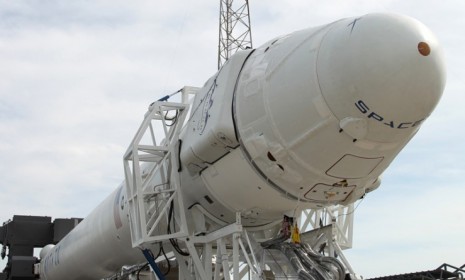SpaceX: Should we cheer private space flight?
With the first privately-owned spacecraft heading for the International Space Station on May 19, space enthusiasts argue that it's time to stop mourning NASA's decline

A free daily email with the biggest news stories of the day – and the best features from TheWeek.com
You are now subscribed
Your newsletter sign-up was successful
On the same day that a teary-eyed NASA crew powered down the last space shuttle, Endeavor, for the last time, the U.S. space agency greenlit the May 19 launch of the shuttle fleet's first private successor, the SpaceX Dragon. If all goes according to plan, the unmanned Dragon cargo capsule will launch atop a SpaceX Falcon 9 rocket, orbit the Earth, then dock at the International Space Station, whose crew will unload the enclosed supplies and send the capsule back for a splash landing off the coast of California. SpaceX, owned by PayPal co-founder Elon Musk, has also announced a partnership with Bigelow Aerospace to shuttle people to inflatable orbiting space capsules — think labs or hotel rooms — as early as 2014. With the SpaceX program, we're "opening a new era in human exploration," says Gizmodo's Jesus Diaz. But how much should we really cheer the dawning "billionaire age" in space travel?
We should all be invested in SpaceX's success: The Dragon is carrying more than tortillas and Tang, says John Harlow in The Australian. It also holds "the hopes of a new generation of billionaire 'space junkies' that private enterprise will now carry forward the torch of exploration lit by NASA" half a century ago. NASA has been fading since the tragic shuttle explosions in 1986 and 2003, and if Musk and his fellow space-obsessed tech titans have their way, they'll use NASA's discarded talent to turn space into "a publicly accessible economic and cultural phenomenon," just like they did with the internet.
"America's new private space race"
The Week
Escape your echo chamber. Get the facts behind the news, plus analysis from multiple perspectives.

Sign up for The Week's Free Newsletters
From our morning news briefing to a weekly Good News Newsletter, get the best of The Week delivered directly to your inbox.
From our morning news briefing to a weekly Good News Newsletter, get the best of The Week delivered directly to your inbox.
Let's not get ahead of ourselves: The Bigelow deal in particular shows that "the commercial space industry is maturing quickly and has an eye on the future," says Max Eddy at Geekosystem. But "quickly" is a relative term. Eventually, companies like SpaceX will allow "everyday folks to slip the surly bonds of Earth," but we're years, or even decades from accessible space tourism. Getting to space is still expensive and dangerous, and it will take loads of trips financed by the highest bidder before we mere mortals head to the heavens.
"SpaceX announces partnership with inflatable space station maker..."
Congress still might mess everything up: NASA is critical to these private companies' success — remember, it's still the biggest client for commercial space travel, says John Kelly in Florida Today. But Congress may still stupidly vote to end the successful competition that NASA is inspiring "among multiple contractors vying to deliver a new, privatized system to carry astronauts to and from the space station." The competition is spawning innovation. But Congress might boneheadedly pick a winner now, which would only ensure future bloat and sloth.
"Congress could kill rocket builders' new space race"
A free daily email with the biggest news stories of the day – and the best features from TheWeek.com
-
 Film reviews: ‘Send Help’ and ‘Private Life’
Film reviews: ‘Send Help’ and ‘Private Life’Feature An office doormat is stranded alone with her awful boss and a frazzled therapist turns amateur murder investigator
-
 Movies to watch in February
Movies to watch in Februarythe week recommends Time travelers, multiverse hoppers and an Iraqi parable highlight this month’s offerings during the depths of winter
-
 ICE’s facial scanning is the tip of the surveillance iceberg
ICE’s facial scanning is the tip of the surveillance icebergIN THE SPOTLIGHT Federal troops are increasingly turning to high-tech tracking tools that push the boundaries of personal privacy